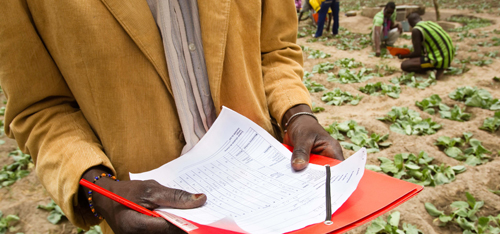Programme overview
The Integrated Production and Pest Management (IPPM) Programme was established in 2001, initially covering three countries in the West African region. With the principal objective of improving farming skills and raising smallholder farmers’ awareness of risks from and alternatives to toxic chemicals, the programme has since significantly expanded its scope and is now present in 10 countries. To date, it has worked with more than 180 000 farmers, resulting mostly in improved yields and incomes, and making substantial progress in reducing the use of chemical pesticides.
Through the development of national infrastructures for field-based training in IPPM, the programme has attracted the interest of other development initiatives to partner with its established network based on the farmer field schools (FFS) approach, including efficient national coordination units, hundreds of trained facilitators, functional relationships between the FFS staff and national and district-level institutions and local communities, and expertise in translating technical messages into farmer-friendly language.
As a result, development projects dealing with rice, vegetables, cotton, river pollution, adaptation to climate change and a host of specialty crops are now using the FFS infrastructure and expertise provided by the programme.
The framework of the programme is built on three main objectives: developing local farming capacity, improving food security and livelihoods and raising awareness.
Capacity development
To introduce, develop and encourage adoption of a community-based approach to capacity development that:
- focuses on developing farmer skills for improving agricultural management through application of techniques based on non-formal, discovery-based learning methods at the farmer and trainer level;
- involves all relevant actors at multiple levels: community, district, national and regional;
- emphasizes informed decision-making through an experimental, self-evaluative and “adaptive management” approach to agricultural research-extension systems; and
- helps farmers understand the basic mechanisms of the most important biological and ecological processes and how these processes can be encouraged through good management to contribute to improved productivity, profitability and system resilience.
Food security and livelihoods
To help participating countries develop a positive and consistent trend toward increased food security and improved livelihoods, the programme begins by organizing farmers in season-long, exploratory learning sessions that aim to:
- optimize the use of available inputs, including the elimination or large-scale reduction in use of toxic pesticides (i.e., WHO Category Ia, Ib and II pesticides);
- improve soil fertility management practices in order to increase water penetration and retention, nutrient-holding capacity, and diversity and activity of soil biota;
- increase yields and net farm income;
- help farmers to diversify farming systems in order to improve both ecological and economic resilience, as well as nutritional diversity; and
- assist farmers to better understand and manage economic decision making in order to increase profitability, including developing skills related to better local and regional marketing, basic business skills and self-financing mechanisms.
Awareness raising
To raise awareness at all levels as to the negative externalities associated with many agricultural practices and the positive alternatives that exist, including:
- understanding the high risks and or benefits associated with most pesticide practices and the availability of low-toxicity alternatives;
- developing capacity in local laboratories and universities for improved environmental monitoring of toxic chemicals in food and water;
- sharing results from the programme at all levels, from farmers to decision makers, through all appropriate avenues, including media (radio, TV, bulletins); and
- assisting with the development of better national policies with regard to agriculture and its interaction with communities and the environment.

